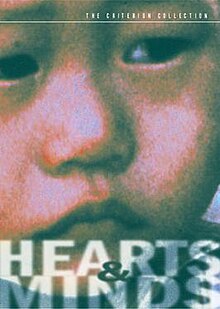Hearts and Minds (film): Difference between revisions
the word "carefully" was in quotes in the article, was cited in the original version and carefully reinserted here |
revert, this attribution makes it appear that the quote isnt in the film, and only appeas in the WP |
| (4 intermediate revisions by one other user not shown) | |
(No difference)
| |
Revision as of 14:32, 27 January 2008
- This article refers to the 1974 movie; for other uses see Hearts and Minds (disambiguation)
| Hearts and Minds | |
|---|---|
 | |
| Directed by | Peter Davis |
| Produced by | Bert Schneider, Peter Davis |
| Distributed by | Rialto Pictures |
Release date | 1974 |
Running time | 112 min. |
| Language | English |
| Budget | $1,000,000 |
Hearts and Minds is an Academy Award winning documentary about the Vietnam War directed by Peter Davis.
The film premiered at the 1974 Cannes Film Festival and won the 1974 Academy Award for Best Feature Documentary. Commercial distribution was delayed in the United States due to threats and lawsuits, including a restraining order obtained by one of the interviewees, former National Security Advisor Walt Rostow. After Columbia Pictures refused to distribute the picture, Bert Schneider and Henry Jaglom purchased back the rights and released the film in March 1975 through Warner Bros. Pictures.
During his acceptance of the Oscar award, co-producer Bert Schneider said, "It's ironic that we're here at a time just before Vietnam is about to be liberated" and then read a "Greetings of Friendship to all American People" from the North Vietnamese government. Frank Sinatra retaliated later by reading a letter from Bob Hope, another presenter on the show, "The academy is saying, 'We are not responsible for any political references made on the program, and we are sorry they had to take place this evening.'"
Featured individuals
General William Westmoreland, who commanded American military operations in the Vietnam War at its peak from 1964 to 1968 and was United States Army Chief of Staff from 1968 to 1972, was interviewed in the film, telling a stunned Davis that "The Oriental doesn't put the same high price on life as does a Westerner. Life is plentiful. Life is cheap in the Orient." After an initial take, Westmoreland indicated that he had expressed himself inaccurately. After a second take ran out of film, the section was reshot for a third time, and it was the third take that was included in the film.[1][2]
The film includes clips of George Thomas Coker, a United States Navy aviator held by the North Vietnamese as a prisoner of war for 6½ years. According to an article in The Washington Post, Davis "carefully" chose Coker to represent the pro-War side of the film.[2] One of the film's earliest scenes details a homecoming parade in Coker's honor in his hometown of Linden, New Jersey, where he tells the assembled crowd on the steps of city hall that if the need arose, that they must be ready to send him back to war.[3] Answering a student's question about Vietnam at a school assembly, Coker responds that "If it weren't for the people, it would be a beautiful country."[4]
See also
References
- ^ Jackson, Derrick Z. "Derrick Z. Jackson: The Westmoreland mind-set", International Herald Tribune, July 22, 2005. Accessed January 26, 2008.
- ^ a b Desson Thomson (2004). "'Hearts And Minds' Recaptured". The Washington Post. Retrieved 2007-12-23.
- ^ Anderegg, Michael A. "Inventing Vietnam: The War in Film and Television", via Google Books, Temple University Press. Accessed January 10, 2008.
- ^ Ng, David. "Hearts & Minds - DVD Review", Images: a journal of film and popular culture, 2002. Accessed December 22, 2007. "When asked by a student what Vietnam was like, he replies in perfect deadpan: 'If it weren't for the people, it would be a beautiful country.'"
External links
- Hearts and Minds at IMDb
- Criterion Collection essay by Judith Crist
- Criterion Collection essay by George Herring
- Criterion Collection essay by Ngo Vinh Long
- Criterion Collection essay by Robert K. Brigham
- Documentary Viewing Guides - Viewing guides for Hearts and Minds and other documentaries, created by undergraduate students at Trinity University.
